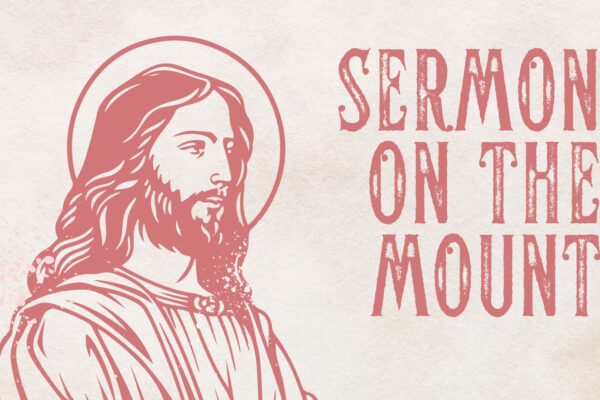Introduction: Continuing the Journey Through the Sermon on the Mount
We’re picking back up our Sermon on the Mount series, specifically diving into our second conversation about “The Beatitudes.” Today, we’ll explore what it means to be truly “blessed,” and how Jesus reframes our understanding of the good life.
What Does It Mean to Be Blessed?
We begin with the word “blessed,” a term both religious and cultural. In many contexts, people view being blessed as a sign of divine favor. It’s a common word, often seen on decorative pillows or social media with hashtags like #Blessed, where people celebrate their good fortune.
But what does it really mean? Is it a vague sense of God’s presence, or something deeper?
In the original Greek text of the New Testament, the word for “blessed” is makarios, which literally means “to be happy” or “fortunate.” Yet, Jesus’s use of makarios in the Beatitudes goes far beyond temporary happiness based on circumstances. He’s referring to a deep, spiritual contentment—an objective state of well-being that isn’t swayed by life’s ups and downs.
The Beatitudes: A Call to Empty Ourselves
Two weeks ago, we explored the first three Beatitudes:
- Blessed are the poor in spirit.
- Blessed are those who mourn.
- Blessed are the meek.
These first three emphasize emptying ourselves—dying to self. Jesus teaches that the blessed life isn’t found in strength or self-sufficiency but in recognizing our weaknesses and depending on God. God blesses weakness over strength, and these Beatitudes remind us to humble ourselves before Him.
Hungering and Thirsting for Righteousness
In Matthew 5:6, Jesus shifts from emptiness to fullness: “Blessed are those who hunger and thirst for righteousness, for they will be filled.”
Jesus calls us to hunger for a deeper kind of righteousness—not the self-righteousness that comes from following rules but the righteousness that comes as a gift through faith in Him. Obeying the letter of the law can lead to pride and judgment, but true righteousness is a gift that we receive through Christ. Those who pursue this kind of righteousness will be filled.
Being Merciful and Receiving Mercy
Next, in Matthew 5:7, we read: “Blessed are the merciful, for they will be shown mercy.”
Mercy is withholding the judgment or punishment someone deserves. As recipients of God’s mercy, we are called to show mercy to others. If we refuse to extend mercy, we’re being both hypocritical and judgmental. Jesus promises that those who show mercy will continue to receive it from God.
Purity of Heart and Seeing God
In Matthew 5:8, Jesus continues: “Blessed are the pure in heart, for they will see God.”
The Pharisees of Jesus’s time focused on outward cleanliness, but Jesus emphasizes inward purity. The ritual cleansing practices in the Mosaic law were meant to point to the greater cleansing we need—of the heart. Only Jesus can purify our hearts, and it’s through this purification that we are able to truly see God, both now and in eternity.
Peacemakers: Reflecting the Nature of God
“Blessed are the peacemakers, for they will be called children of God.” (Matthew 5:9)
To be a peacemaker means to actively pursue reconciliation and peace in all relationships. It’s not merely avoiding conflict but working to bring about true peace. As God reconciled humanity to Himself through Jesus, we are called to be agents of peace, reflecting God’s nature as His children.
Persecution: The Ultimate Test of Faith
Jesus closes the Beatitudes with a sobering truth: “Blessed are those who are persecuted because of righteousness, for theirs is the kingdom of heaven.” (Matthew 5:10)
Persecution for faith is not something most of us experience daily, but Jesus warns us to be prepared. Persecution is part of the Christian life, and we must stand firm, trusting in the ultimate reward—the kingdom of heaven.
Application: Living Out the Beatitudes
As we wrap up this series on the Beatitudes, let’s apply three principles to our lives:
- God Blesses Weakness Over Strength
The Beatitudes remind us that God’s power is perfected in our weakness. When we embrace our dependence on Him, we are truly blessed. - The Good Life is Defined by Love
True happiness comes not from possessions or power but from embodying the love of God. To hunger for righteousness, be merciful, and pursue peace are all acts of love. - The Blessed Life is Cruciform
The life Jesus blesses is shaped by the cross. It involves dying to self and living for Christ, enduring suffering for His sake. But in the end, the cross leads to resurrection and vindication.
Conclusion: The Path to True Happiness
Jesus’s Beatitudes offer a countercultural path to happiness. It’s not about accumulating wealth or avoiding hardship but about living a life shaped by love, mercy, and sacrifice. In following this path, we find the true blessing of God’s kingdom. So, as we go through this week, let’s lean into our weaknesses, embody love, and live lives shaped by the cross.


